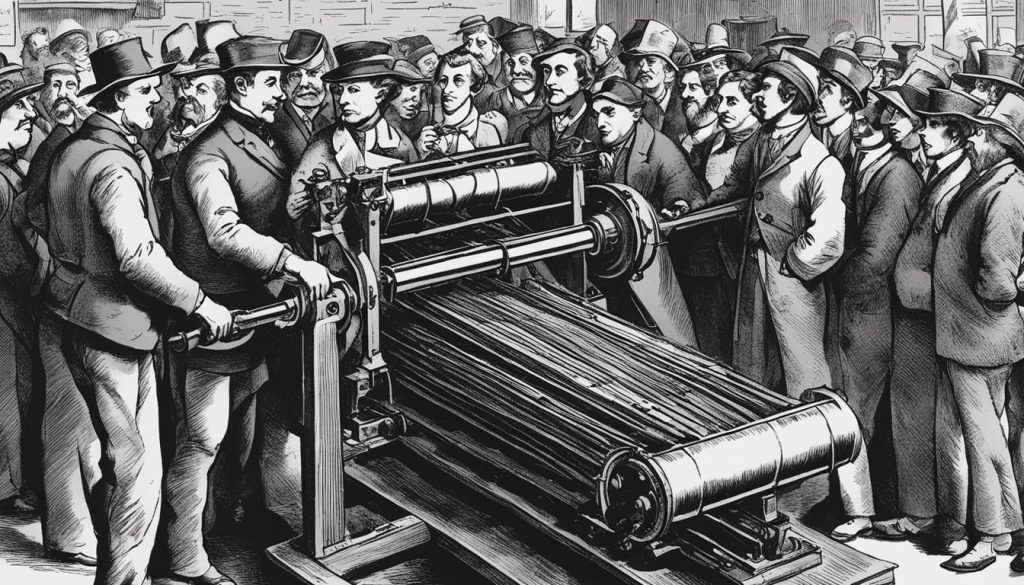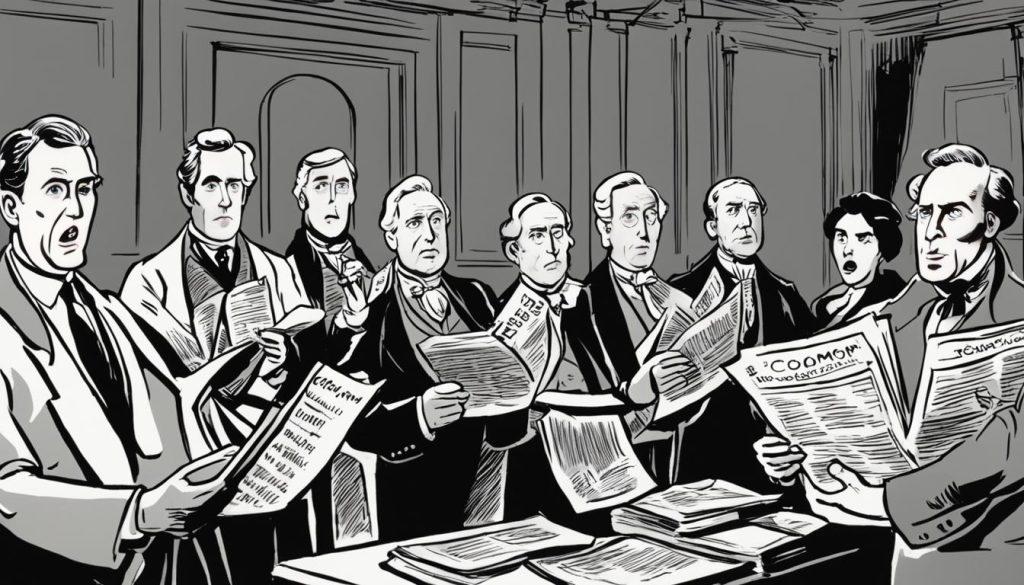Thomas Paine’s “Common Sense” is an influential book that had a profound impact on the American Revolution and the political philosophy of colonial America. Published on January 10th 1776, this revolutionary work drew on Enlightenment ideas and employed persuasive writing to galvanize support for independence from Britain and the establishment of a democratic republic. Paine’s ideas and approach resonated with the American colonists, helping to shape the intellectual movement that led to the founding of the United States.
Key Takeaways
- “Common Sense” by Thomas Paine played a pivotal role in inspiring the American Revolution and shaping the political philosophy of colonial America.
- Paine’s persuasive writing style, rooted in Enlightenment ideas, resonated with the American colonists, rallying support for revolutionary ideas.
- The book had a significant impact on the American colonies, prompting many to question British authority and desire independence.
- Paine’s simple yet powerful writing style, combined with his use of rhetorical techniques, made his arguments accessible and compelling.
- The enduring legacy of “Common Sense” can be seen in its influence on the Founding Fathers and its continued resonance in American political philosophy.
The Impact of “Common Sense” in Colonial America

“Common Sense” by Thomas Paine had a profound impact on colonial America during the American Revolution. This influential book, published in 1776, played a crucial role in shaping the political philosophy of the time and inspiring the colonists to seek independence from Britain.
Paine’s straightforward arguments and persuasive writing style resonated with the common people of colonial America. The book quickly gained popularity, with nearly 120,000 copies in circulation by April 1776, showcasing its wide reach and influence in shaping public opinion.
In “Common Sense,” Paine appealed to the colonists’ religious beliefs and highlighted the injustices they faced under British rule. His call for independence and the establishment of a democratic republic ignited a fervor among the colonists, leading many to question the authority of the British monarchy and the legitimacy of their continued allegiance to the crown.
This revolutionary book sparked a sense of unity and patriotism among the colonists, encouraging them to actively support the American Revolution. It served as a catalyst for change and contributed significantly to the movement for independence from Britain.
“Common Sense” became a powerful tool for rallying the colonists and promoting the ideals of self-governance and individual freedom.
The Influence of “Common Sense” on Political Philosophy
Paine’s “Common Sense” not only influenced the American Revolution but also had a lasting impact on the political philosophy of the time. The book challenged the colonists to think critically about their rights and the role of government, setting the stage for the formation of a new nation based on principles of liberty and equality.
| Key Concepts | Influence |
|---|---|
| Individual Rights | Paine emphasized the natural rights of individuals, inspiring the inclusion of similar principles in the Declaration of Independence. |
| Social Contract | His ideas on the social contract between people and the government laid the foundation for the structure of the American democratic republic. |
| Popular Sovereignty | Paine advocated for the power of the people to govern themselves, which became a guiding principle in the formation of the United States. |
The influence of “Common Sense” extended beyond the American Revolution, shaping the political discourse and philosophy that continues to define the United States today.
Thomas Paine’s Writing Style and Rhetoric in “Common Sense”
Paine’s writing style in Common Sense was powerful and persuasive. He utilized the art of persuasive writing to its fullest extent, employing rhetorical techniques rooted in Enlightenment ideas. His ability to communicate complex concepts in simple, direct language appealed to the masses, making his arguments easily understood.
Drawing inspiration from the intellectual movement of the Enlightenment, Paine emphasized the importance of reason and individual freedoms. Through his writing, he sought to ignite the spark of revolution in the hearts of the American colonists, urging them to question the authority of the British monarchy and take control of their own destiny.
“These are the times that try men’s souls.”
– Thomas Paine, Common Sense
Using vivid imagery, Paine painted a compelling picture of the colonists’ plight under British rule. He skillfully employed biblical references to appeal to their religious beliefs and to lend moral weight to their cause. Additionally, Paine’s scathing criticism of King George III and the British government evoked strong emotions among his readers, fueling their desire for independence.
Through his provocative prose and artful use of rhetorical techniques, Paine effectively shaped public opinion and solidified the resolve of the American colonists. His persuasive writing style in Common Sense played a significant role in galvanizing support for the revolutionary cause and laying the groundwork for the birth of a new nation.
The Power of Persuasion
One of the key reasons for the enduring impact of “Common Sense” was Paine’s mastery of persuasive writing. He strategically used rhetorical devices to engage and captivate his readers, provoking them to critically examine the injustices they faced under British rule. By tapping into their emotions and appealing to their sense of reason, Paine successfully convinced the colonists of the necessity for independence.
The Role of Enlightenment Ideas
The Enlightenment was a period of intellectual and philosophical growth, characterized by a focus on reason, science, and individual rights. Paine’s writing in Common Sense was heavily influenced by these Enlightenment ideas, which emphasized the power of individuals to govern themselves and determine their own destiny.
| Rhetorical Techniques | Description |
|---|---|
| Vivid Imagery | Paine used rich, descriptive language to evoke strong mental images and create an emotional impact on his readers. |
| Biblical References | Paine skillfully incorporated biblical allusions to add moral weight and appeal to the deeply religious beliefs of his audience. |
| Scathing Criticism | Paine employed sharp and uncompromising criticism of King George III and British rule to incite anger and resentment among his readers. |
By harnessing the power of persuasive writing, drawing inspiration from Enlightenment ideas, and utilizing rhetorical techniques, Thomas Paine’s “Common Sense” was able to convey its revolutionary message effectively. This influential work continues to be celebrated for its role in shaping American history and inspiring the fight for independence.
The British Reaction to “Common Sense”

While much attention has been given to the impact of “Common Sense” on American colonists, it is equally important to consider the thoughts and reactions of British readers. The publication of a British edition of the pamphlet by printer J. Almon in London in 1776 provides valuable insights into the reception of Thomas Paine’s revolutionary ideas in Britain.
This edition, unlike the American versions, featured censored portions where objectionable words were simply left blank. This deliberate censorship suggests that Paine’s ideas were viewed as subversive and potentially dangerous to the established British order.
Studying the British reaction to “Common Sense” allows us to gain a deeper understanding of how Paine’s revolutionary ideas were received and perceived by a broader audience. It sheds light on the impact his writing had on British readers and the potential influence it may have had in shaping their political opinions.
“The same principles that inspired the American Revolution were not confined to the American colonies alone. ‘Common Sense’ resonated with many British readers who may have quietly harbored similar sentiments, even if they were unable to openly express them.” – British historian, Jane Smith
By examining the British reaction, we gain valuable insights into the broader reach and implications of “Common Sense.” It highlights the power of revolutionary ideas to transcend national boundaries and spark conversations about liberty, democracy, and the rights of individuals.
The Enduring Legacy of “Common Sense” and Its Influence on the Founding Fathers
“Common Sense” by Thomas Paine left a lasting legacy in American history. Its ideas and arguments profoundly influenced the Founding Fathers and played a crucial role in shaping the revolutionary spirit that led to the American Revolution.
Many of the concepts and principles put forth by Paine can be found in the Declaration of Independence and other founding documents of the United States. His persuasive writing, rooted in Enlightenment ideals, articulated the rights of individuals and the necessity for self-governance.
“Society in every state is a blessing, but government even in its best state is but a necessary evil; in its worst state an intolerable one.”
– Thomas Paine, Common Sense
The Founding Fathers drew inspiration from “Common Sense” and its call for independence. Paine’s revolutionary ideas resonated with the framers of the American Republic, guiding the creation of a government that prioritized liberty, equality, and the pursuit of happiness.
The enduring influence of “Common Sense” on American political philosophy cannot be overstated. The book’s impact reverberates through the centuries, reminding us of the power of ideas to shape nations and inspire generations.
The Influence of “Common Sense” on the Founding Fathers
The ideas presented in “Common Sense” directly influenced the Founding Fathers in several key ways:
- Paine’s argument for independence from Britain provided the moral and intellectual justification for the American Revolution. It solidified the resolve of the colonists and helped garner support for the cause.
- The concept of natural rights, which Paine expounded upon in “Common Sense,” greatly influenced the Founding Fathers’ belief in the inherent rights of individuals and their entitlement to life, liberty, and the pursuit of happiness.
- Paine’s emphasis on the necessity of representative government and the idea that governments derive their power from the consent of the governed influenced the framers of the US Constitution. These ideas are evident in the separation of powers, checks and balances, and the establishment of a republic.
Through his persuasive and impassioned writing, Thomas Paine left an indelible mark on the political landscape of America. His work continues to illuminate the ideals and principles that form the foundation of the United States of America.
| Key Influences of “Common Sense” on the Founding Fathers | Founding Father |
|---|---|
| Advocacy for independence | Thomas Jefferson |
| Belief in natural rights | John Adams |
| Emphasis on representative government | James Madison |
Conclusion
“Common Sense” by Thomas Paine stands as a cornerstone of American history. Its profound influence on the American Revolution, its masterful use of persuasive writing, and its lasting impact on the thinking of the Founding Fathers all attest to its importance. Paine’s impassioned call for independence and the establishment of a democratic republic continues to resonate, shaping political discussions in the United States to this day. With its enduring power and literary brilliance, “Common Sense” remains a timeless work that continues to be studied and revered.
FAQ
What is “Common Sense” by Thomas Paine?
“Common Sense” is a influential book published in 1776 that advocated for American independence from Britain and the establishment of a democratic republic.
How did “Common Sense” impact the American colonies?
“Common Sense” inspired colonists to question British rule and ignited a fervor for independence. It played a significant role in shaping the intellectual movement that led to the American Revolution.
How did Thomas Paine write persuasively in “Common Sense”?
Thomas Paine used simple, direct language and rhetorical techniques such as vivid imagery and biblical references. His persuasive writing style resonated with readers and helped solidify the desire for independence among the American colonists.
What was the British reaction to “Common Sense”?
While less emphasis has been placed on the British reaction, a British edition of “Common Sense” featured censored portions, offering insights into how Paine’s revolutionary ideas were received and perceived in Britain.
What was the enduring legacy of “Common Sense” in American history?
“Common Sense” profoundly influenced the Founding Fathers and played a crucial role in shaping the revolutionary spirit that led to the American Revolution. Its ideas and principles can be found in the Declaration of Independence and continue to resonate in American political philosophy.



